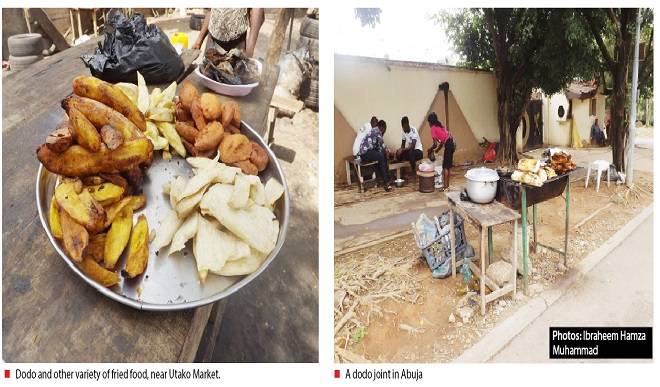
‘Dodo’ has become a popular roadside delicacy in Abuja. (Dodo is a Yoruba name for peeled and fried plantain commonly eaten with palm oil, sauce, fish or fried chicken.) According to Mr. Emmanuel Okpe, an Idoma-man from Benue State, he has been eating dodo with bread and soft drinks for lunch for about six years in Abuja and likes it more than any other food. “I don’t mind taking it as dinner as well,” he said.
Many major junctions and those leading to Area Councils and satellite towns bordering Abuja and other states have women selling fast foods. Among these is always dodo, fried or roasted yam, beans cakes (akara) fish and several more. Near Aso Rock Villa, where the Nigerian president lives, spots where these are sold have sprung up. One can be seen near Police Headquarters as both police and staff around the area, patronize the roadside delicacy.
In Maitama, another highbrow area in Abuja, dodo is being sold at Amazon River Close, off Alvan Ikoku Way. Being in an exclusive area, sauce, fish and chicken parts are available because customers in the area are rich, aside from other staff and labourers. Other places include Asokoro, Gwarimpa, Wuse, and Garki. They are also in markets, garages, the federal secretariat, Eagle Square, among others.
Along Airport Road Junction, most women who fry dodo hawk to drivers of taxies who sometimes eat while driving. The number of women engaged in the trade continues to increase along Airport Junction to Umaru Musa Yar’adua Way.
A woman selling dodo in Maitama was once a restaurateur. When she realized that the demand for food was dwindling due to the downturn of the economy, she abandoned the food venture. She was about to retire to fate and search for a house-keeping job to supplement the little earning of her husband when she realized that many people ask where they can buy dodo and other roadside fast foods. This was how she began to sell dodo and yam. When customers asked for particular items like fish, meat and chicken parts, she learned fast and started buying and selling them. Today, she does not regret her decision. She now makes local drinks like Kunu, Zobo and ginger to complement what she sells, and has employed the services of a girl as sales representative.
An Igala-man from Dekina Local Government Area of Kogi State, Suleman Yahaya assists his sister as she fries dodo, akara, yam, and sweet potato in Utako Market. “It is better than begging and stealing,” he said. “I sometimes serve people on credit because they have been patronizing us and said they don’t have money to pay. I know they would pay later. Sometimes people beg us to assist them with food because they are hungry and we do give them as we are all human beings and Nigerians.”
This reporter gathered that in areas where people don’t care about meat or fish on a regular basis, one needs about N5,000 to start the business with plantain, yam and sauce. In highbrow areas where they there is high demand for fish, beef and chicken parts, about N20, 000 may do to start. Things needed include water, frying pan, yam, plantain, beans, charcoal, frying oil, plastic plates, spoons, disposable plates, an umbrella and so on.
Most of the traders said they are making profit ranging from N2,000 to 6,000 naira daily and are able to care for their families. The major challenge they face, however, is harassment from authorities because they are unable to rent shops in the city.

 Join Daily Trust WhatsApp Community For Quick Access To News and Happenings Around You.
Join Daily Trust WhatsApp Community For Quick Access To News and Happenings Around You.



